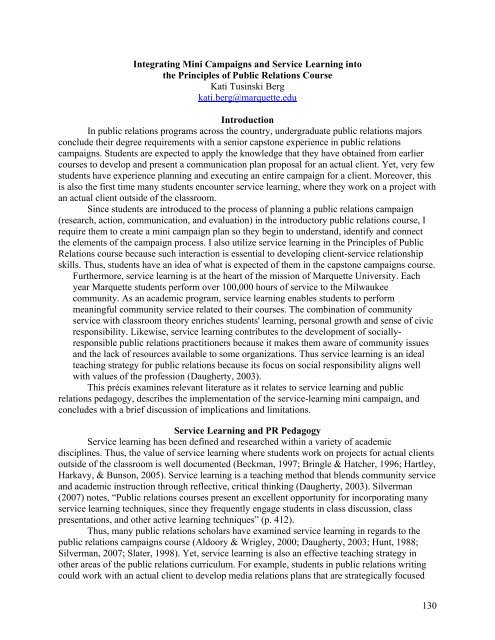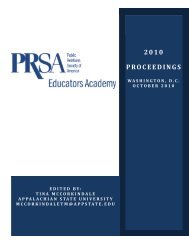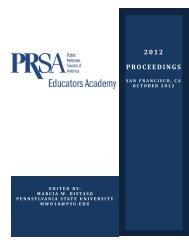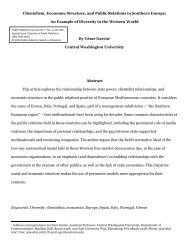2008 PROCEEDINGS - Public Relations Society of America
2008 PROCEEDINGS - Public Relations Society of America
2008 PROCEEDINGS - Public Relations Society of America
You also want an ePaper? Increase the reach of your titles
YUMPU automatically turns print PDFs into web optimized ePapers that Google loves.
Integrating Mini Campaigns and Service Learning into<br />
the Principles <strong>of</strong> <strong>Public</strong> <strong>Relations</strong> Course<br />
Kati Tusinski Berg<br />
kati.berg@marquette.edu<br />
Introduction<br />
In public relations programs across the country, undergraduate public relations majors<br />
conclude their degree requirements with a senior capstone experience in public relations<br />
campaigns. Students are expected to apply the knowledge that they have obtained from earlier<br />
courses to develop and present a communication plan proposal for an actual client. Yet, very few<br />
students have experience planning and executing an entire campaign for a client. Moreover, this<br />
is also the first time many students encounter service learning, where they work on a project with<br />
an actual client outside <strong>of</strong> the classroom.<br />
Since students are introduced to the process <strong>of</strong> planning a public relations campaign<br />
(research, action, communication, and evaluation) in the introductory public relations course, I<br />
require them to create a mini campaign plan so they begin to understand, identify and connect<br />
the elements <strong>of</strong> the campaign process. I also utilize service learning in the Principles <strong>of</strong> <strong>Public</strong><br />
<strong>Relations</strong> course because such interaction is essential to developing client-service relationship<br />
skills. Thus, students have an idea <strong>of</strong> what is expected <strong>of</strong> them in the capstone campaigns course.<br />
Furthermore, service learning is at the heart <strong>of</strong> the mission <strong>of</strong> Marquette University. Each<br />
year Marquette students perform over 100,000 hours <strong>of</strong> service to the Milwaukee<br />
community. As an academic program, service learning enables students to perform<br />
meaningful community service related to their courses. The combination <strong>of</strong> community<br />
service with classroom theory enriches students' learning, personal growth and sense <strong>of</strong> civic<br />
responsibility. Likewise, service learning contributes to the development <strong>of</strong> sociallyresponsible<br />
public relations practitioners because it makes them aware <strong>of</strong> community issues<br />
and the lack <strong>of</strong> resources available to some organizations. Thus service learning is an ideal<br />
teaching strategy for public relations because its focus on social responsibility aligns well<br />
with values <strong>of</strong> the pr<strong>of</strong>ession (Daugherty, 2003).<br />
This précis examines relevant literature as it relates to service learning and public<br />
relations pedagogy, describes the implementation <strong>of</strong> the service-learning mini campaign, and<br />
concludes with a brief discussion <strong>of</strong> implications and limitations.<br />
Service Learning and PR Pedagogy<br />
Service learning has been defined and researched within a variety <strong>of</strong> academic<br />
disciplines. Thus, the value <strong>of</strong> service learning where students work on projects for actual clients<br />
outside <strong>of</strong> the classroom is well documented (Beckman, 1997; Bringle & Hatcher, 1996; Hartley,<br />
Harkavy, & Bunson, 2005). Service learning is a teaching method that blends community service<br />
and academic instruction through reflective, critical thinking (Daugherty, 2003). Silverman<br />
(2007) notes, “<strong>Public</strong> relations courses present an excellent opportunity for incorporating many<br />
service learning techniques, since they frequently engage students in class discussion, class<br />
presentations, and other active learning techniques” (p. 412).<br />
Thus, many public relations scholars have examined service learning in regards to the<br />
public relations campaigns course (Aldoory & Wrigley, 2000; Daugherty, 2003; Hunt, 1988;<br />
Silverman, 2007; Slater, 1998). Yet, service learning is also an effective teaching strategy in<br />
other areas <strong>of</strong> the public relations curriculum. For example, students in public relations writing<br />
could work with an actual client to develop media relations plans that are strategically focused<br />
130
















